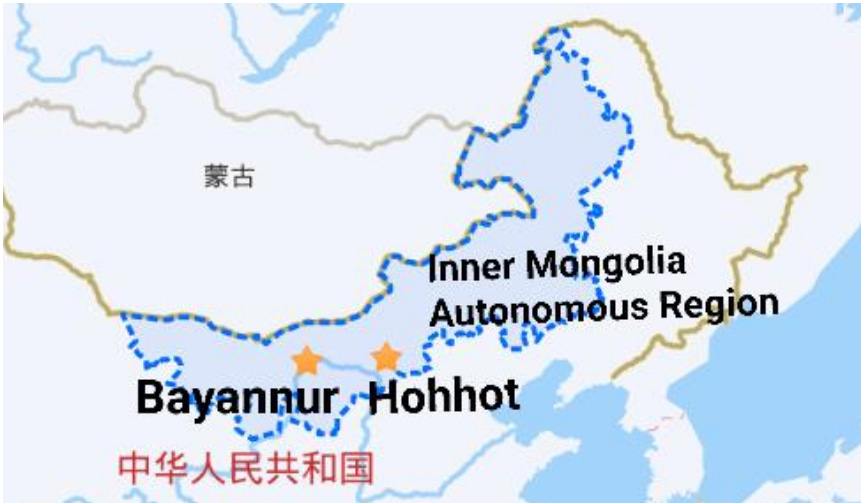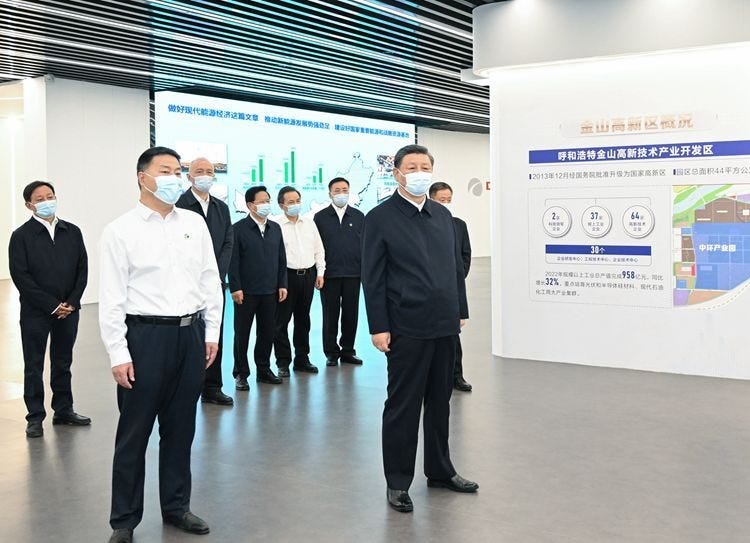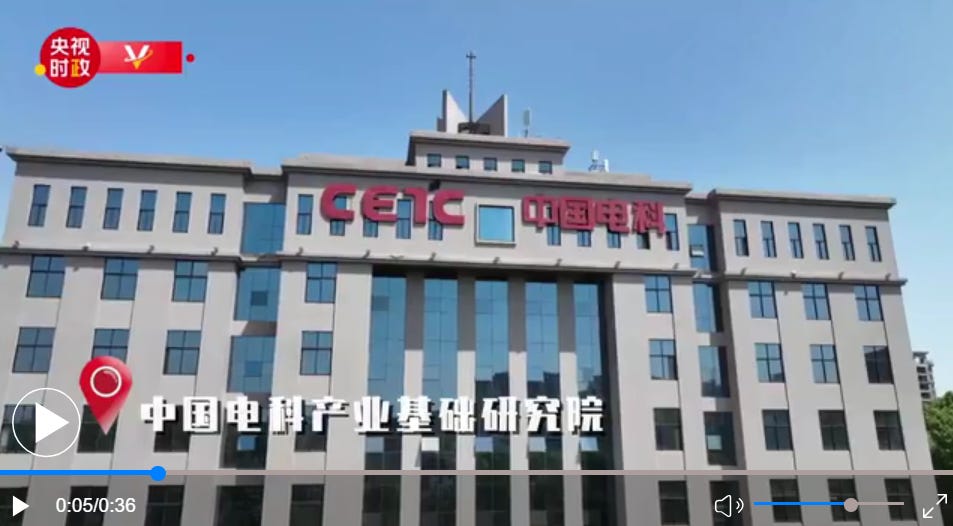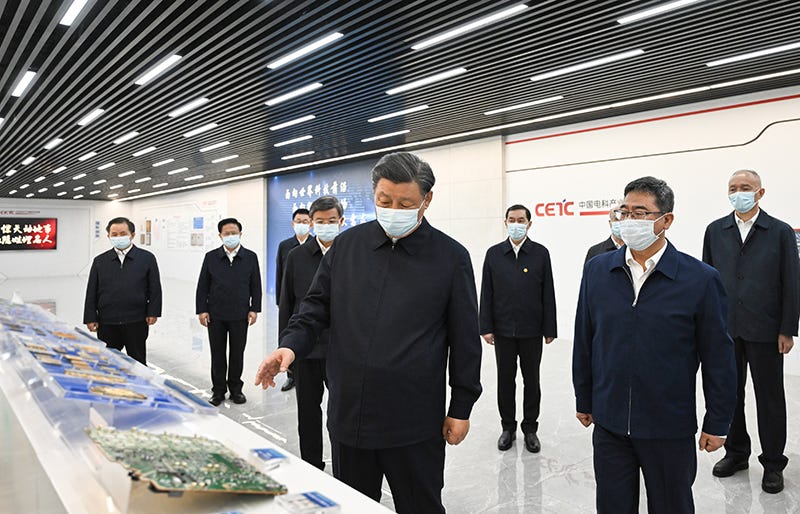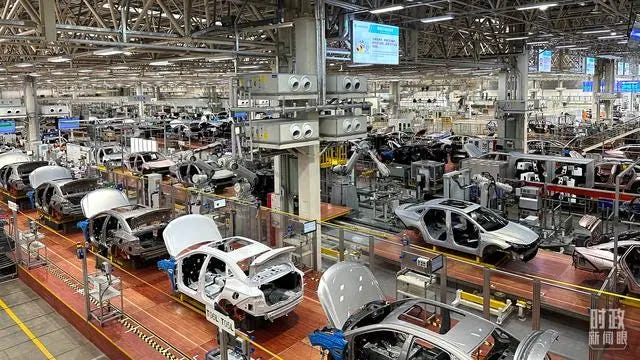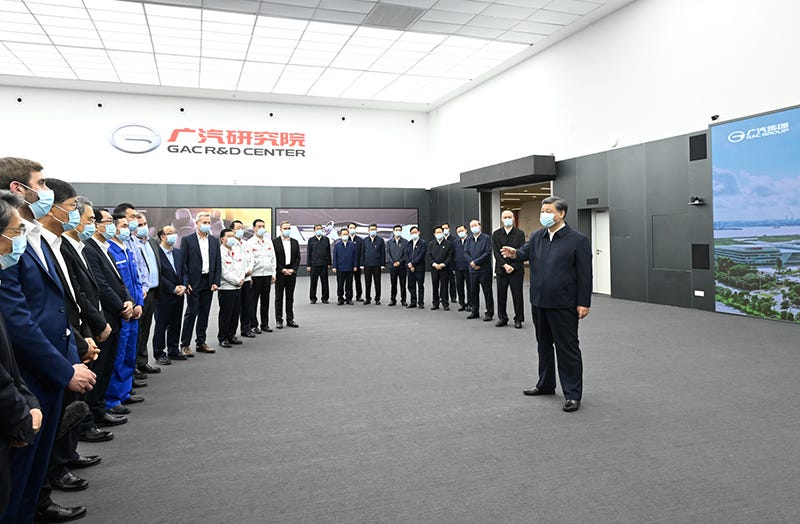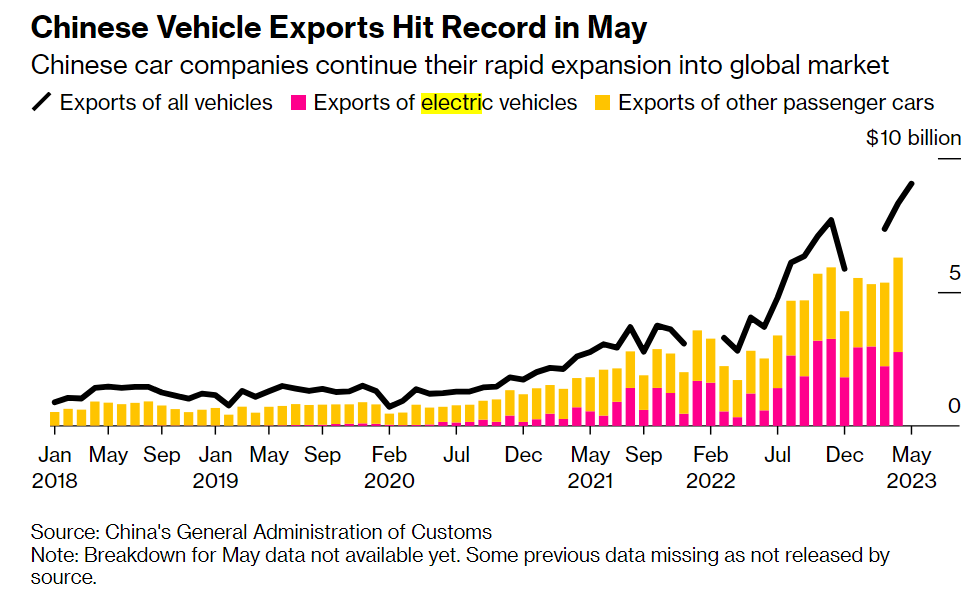Xi Jinping's inspection tours: A closer look at the targeted industries
New energy, semiconductors, etc.
Xi Jinping's comprehensive four-day inspection tour in the expansive Inner Mongolia Autonomous Region, boasting the longest longitude and the second largest latitude in China, concluded on Thursday.
As GRR counts, this is Xi's fourth inspection tour out of Beijing to local areas this year. The other three are the inspections in Guangdong Province in April, the inspections in Hebei Province in May, and the inspections in Shanxi and Shaanxi provinces ahead of the China-Central Asia Summit in Xi'an, Shaanxi Province.
It is also the third time Xi has inspected the Inner Mongolia Autonomous Region over the past 10 years or so.
According to Xinhua, Xi inspected the city of Bayannur, Inner Mongolia, from Monday to Tuesday, where he urged sustained efforts to tackle desertification. A separate article from Xinhua shows that Xi inspected the capital city of Hohhot from Wednesday to Thursday. He called on the Inner Mongolia Autonomous Region to pursue green development and strive for Chinese modernization.
Today's piece, first of all, based on Xi's inspection this time, extends coverage to his other two in recent months, aiming to decode the enterprises highlighted in the inspection.
Secondly, it will briefly examine Xi's previous two inspection tours to Inner Mongolia to see what is important to this autonomous region.
Xinhua has released a full-text English translation of the official Chinese report for Xi's inspection from Monday to Tuesday and an English readout on Xi's inspection in Hohhot from Wednesday to Thursday hours ago. The links are provided here in case some of you want to delve into it in detail.
Part 1
Enterprises and industrial parks are often among the stops on Xi's inspection schedule, with this trip to Inner Mongolia Autonomous Region this week no exception.
On Wednesday afternoon, Xi inspected an industrial park, a photovoltaic industry base in Hohhot, the capital city of Inner Mongolia. There he was briefed on local efforts in developing industries of new energy and new materials, optimizing and adjusting industrial structure, and pursuing green and low-carbon development.
At the manufacturing shop, Xi learned about the R&D and production of semiconductor and photovoltaic materials by park-based companies.
He stressed the need to adhere to the path of green development, and called for efforts to promote the transformation and upgrading of traditional energy industries while beefing up support for eco-friendly energies.
Xi said China now needs to depend on high-standard self-reliance and strength in science and technology and a new development pattern to make S&T breakthroughs.
In Xi's speech, there's a statement that could potentially draw a lot of attention from China watchers:
构建国内大循环是为了保证极端情况下国民经济能够正常运行,这同参与国际经济循环是不矛盾的。
Building a strong domestic economy is for ensuring normal operation of national economy under extreme circumstances which is not contradictory to participating in international economic circulation.
Note the “极端情况” "extreme circumstances" was mentioned by Xi not for the first time. At a high-profile meeting of the Communist Party of China (CPC) Central Committee in 2020, he said:
在当前国际形势充满不稳定性不确定性的背景下,立足国内、依托国内大市场优势,充分挖掘内需潜力,有利于化解外部冲击和外需下降带来的影响,也有利于在极端情况下保证我国经济基本正常运行和社会大局总体稳定。
In the context of the current international situation full of instability and uncertainty, relying on the advantages of domestic market and fully tapping the potential of domestic demand is conducive to resolving the impact of external shocks and declining demand, and is also conducive to ensuring basic normal operation of China's economy and the overall stability of society under extreme circumstances.
So far, however, there is no more authoritative information clarifying the so-called "extreme circumstance." The use of the word "extreme" also reminds your Ginger River of the Party's emphasis on national security at the first meeting of the National Security Commission under the 20th CPC Central Committee on May 30.
会议强调,当前我们所面临的国家安全问题的复杂程度、艰巨程度明显加大。国家安全战线要树立战略自信、坚定必胜信心,充分看到自身优势和有利条件。要坚持底线思维和极限思维,准备经受风高浪急甚至惊涛骇浪的重大考验。
It was stressed at the meeting that the complexity and severity of national security problems faced by our country have increased dramatically. The national security front must build up strategic self-confidence, have enough confidence to secure victory, and be keenly aware of its own strengths and advantages. We must be prepared for worst-case and extreme scenarios, and be ready to withstand the major test of high winds, choppy waters, and even dangerous storms.
In Hohhot, Xi also called for resolute efforts to expand high-level opening-up and realize win-win cooperation, participate in the co-construction of the Belt and Road initiative and the development of the China-Mongolia-Russia Economic Corridor, thus enhancing China's level of opening-up, establishing an important gateway for China's northward opening-up, and leveraging the greater role of Inner Mongolia in connecting domestic and international circulations.
In fact, his other two inspection tours, one to south China's Guangdong Province in April and the other to northern Hebei Province in May, also led him to institutes and enterprises related to the sectors of semiconductors and new energy.
Xi's inspection tour in Hebei in May: Semiconductor research institute
During the inspection to Hebei Province in mid-May, Xi visited 中国电科产业基础研究院 a research institute of China Electronics Technology Group Corporation in the capital city of Shijiazhuang to learn about relative R&D and production.
Since 1956, the institute has been engaged in semiconductor research. It is the birthplace of original technologies concerning semiconductors, sensors, microsystems and integrated circuits in China. Its various products, including solid-state microwave products and electronic ceramic casings, have provided strong support for the development of digital economy and industries, such as 5G base stations, new energy vehicles, and optical communications.
At the institute, Xi encouraged researchers to achieve consistent progress in grasping cutting-edge technologies and developing more technological and engineering equipment and projects of great significance.
China's burgeoning semiconductors have drawn fire from the U.S. The enactment of the CHIPS and Science Act of 2022 prohibits chip funds from being used for investment in China and Chinese companies from participating in the Manufacturing USA network.
Xi's inspection tour in Guangdong in April: New energy carmaker
During the inspection of the southern city of Guangzhou in April, Xi paid a visit to the GAC Aion New Energy Automobile Co., Ltd, a top new energy vehicle (NEV) manufacturer in China.
The production line at the assembly shop of the carmaker is equipped with intelligent chips, which can identify customized processes and independently adapt to the assembly. Currently, intelligence and NEV are among the emerging pillar industries of Guangzhou.
Xi has pointed out that the automobile industry is one with a large market, of high technical standard and in need of delicacy management. The development of NEVs is the only way for China to move from an automobile country to an automobile power.
Statistics from the General Administration of Customs, Chinese imports and exports slightly expanded 0.5 percent to 3.45 trillion yuan (about 484 billion U.S. dollars) in May, with exports down 0.8 percent. Yet the export of vehicle industry, with NEVs as the mainstay, increased nearly 80 percent in the first five months. Observers say NEVs export will sustain growth momentum and serve as a key underpinning of China's exports, not only currently but also in the future.
China Exports Drop More Than Expected, Fueling Growth Risks -- Bloomberg
One sustaining bright spot for Chinese exporters was the continued strength of global demand for Chinese cars, with total vehicle shipments hitting a record for any single month of $9 billion. One of the drivers of the recent surge in car exports has been the popularity overseas of Chinese electric vehicles, although shipments of other types of cars have also been rising.
A week ago, Tesla CEO Elon Musk met with several senior Chinese officials, including Foreign Minister Qin Gang, Minister of Commerce Wang Wentao, as well as Minister of Industry and Information Technology Jin Zhuanglong, and also paid a visit to the Tesla Shanghai Gigafactory during his trip to China from May 30 to June 1, during which he praised China's vitality and potential, voiced confidence in the Chinese market and expressed willingness to deepen cooperation.
Part 2
What is important to Inner Mongolia Autonomous Region?
Ecological conservation and environmental protection have been consistently highlighted in Xi's inspection tours in the Inner Mongolia Autonomous Region in the past three times.
Here is a brief review of these inspections:
China is one of the countries plagued by the most serious desertification in the world. The Inner Mongolia grassland serves as an important ecological shield for Beijing and even north China at large.
During an inspection tour to the region in 2019, Xi went to a forestry station in the city of Chifeng, where he learned about local efforts in ecological conservation and forestation. He noted that China is the largest contributor to man-made forest coverage in the world, and stressed the need to firmly pursue green development that puts ecology first.
In another inspection tour of the region in 2014, Xi urged efforts to build an ecological conservation system and explore a path of green development that is in accordance with natural law and suitable for the national conditions and realities of the region.
In this week's inspections, Xi stressed that to strengthen comprehensive prevention and control of desertification and further carry out the construction of such key ecological projects as the Three-North Shelterbelt Forest Program (TSFP) is of great concern to China's ecological security, the building of a great country, and the sustainable development of the Chinese nation.
Ethnic solidarity and the well-being of ethnic minority groups are also a concern to Xi in these inspections. When visiting a residential community in Chifeng in 2019, he noted that Inner Mongolia is the birthplace of China's system of regional ethnic autonomy and has upheld ethnic solidarity as a tradition.
During this inspection from Wednesday to Thursday, Xi stressed that the most arduous task of promoting common prosperity lies in border areas with mainly ethnic minority populations.
At the end of this inspection, Xi stressed that promoting the entire Party to address prominent problems with Party conduct in the spirit of self-reform through education campaigns is an important historical experience.
The statement is in line with an article by the country's top anti-corruption watchdog published in People's Daily on Tuesday, saying the authorities will keep high pressure on key sectors including finance, state-owned enterprises, universities, statistics, sports and agriculture, in terms of corruption crackdown.
"坚决防止转变风向、降调变调的错误期待" "We must resolutely prevent the wrong expectation of changing our direction or loosening our grip," the Central Commission for Discipline Inspection said.
To help make Ginger River Review sustainable, please consider buy me a coffee or pay me via Paypal.




